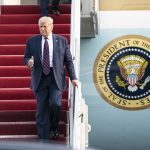President Trump has once again turned the trade tables, announcing a new round of tariffs on Canada, Mexico, and China that would make any protectionist proud. In a bold move, he signed a series of executive orders stating his case with a flair for the dramatic: he’s declaring a “national economic emergency.” Apparently, the border crisis and the fentanyl flood count as urgent business, and if punishing trade partners is the way to get results, so be it.
With his characteristic bravado, Trump asserted the need to protect American citizens, emphasizing his original campaign promise to tackle illegal immigration and the drug menace that follows. With a mere click on Truth Social, the Commander-in-Tweet proclaimed that Americans voted in favor of this tough approach, seemingly ignoring the potential backlash from trade partners. After all, who needs friends when you can apply tariffs?
The details are as juicy as they are controversial. Under the International Emergency Economic Powers Act—because it’s not just a “regular” emergency—it’s a “national emergency”—the president slapped on a 25% additional tariff on goods from Canada and Mexico, while China received a slightly kinder 10% addition. Surprisingly, energy imports from Canada will only face a lower 10% tariff, perhaps a nod to maintaining some semblance of sanity amidst chaos, as if to say, “We still need our oil, just not too much of it!”
Economists are already clutching their pearls, predicting that these tariffs could lead to increased prices on everyday items, which sounds like a mixed blessing for American consumers. On one hand, supporting Trump’s tough-love policies; on the other hand, wrestling with a bigger grocery bill. Isn’t it just like Trump to promise short-term pain for long-term gain? Meanwhile, they predict an $830 tax hike per average household this year and a staggering $1.2 trillion increase over the next decade. It seems fiscal responsibility is taking a backseat to Mr. Trump’s trade bravado.
President Trump on Saturday ordered tariffs on Canada, Mexico and China, making good on his threats to punish the U.S. trade partners. https://t.co/H6tsK4BHwG
— The Washington Times (@WashTimes) February 2, 2025
The specter of retaliation looms large as Canada and Mexico’s leaders have signaled they are ready to hit back if necessary. To anyone keeping score, this is the moment where Trump’s ‘tariff retaliation clauses’ come into play. After all, if you’re going to play hardball, you might as well be prepared to keep raising those tariffs higher if your neighbors decide to retaliate. In Trump’s economic playbook, the sky isn’t the limit; it’s just a temporary ceiling.
Former President Biden, rather predictably, has kept many of Trump’s tariffs in place, with his own increases adding additional tax burdens on hardworking Americans. Both administrations seem to echo the sentiment that it’s always open season on the American consumer when dealing with international trade policies. In the end, it seems voters are left to wonder which is more burdensome: the rising prices or the buffering trade tension, which, in true political fashion, is just a circus act leading the way to the next economic round.




